【法语语法】未完成过去时L27imparfait
未完成过去时( l'imparfait )的用法

、未完成过去时(l'imparfait )的用法未完成过去时(L'imparfait)是用来描述过去的时态。
它用来表示过去正在进行的状态或是未完成的重复动作。
动作或是状态的起始结束时间是未知的。
它的用法相当于英语中的"was" 或是"was ___-ing."未完成过去时的用法有下面几种:1、表示习惯的动作或是某个状态Quand j'étais petit, nous allions à la plage chaque semaine.When I was young, we used to go to the beach every week.L'année dernière, je travaillais avec mon père.I worked with my father last year.2、用来描写自然状态或是情绪状态,如:时间、气候、年龄、感受Il était midi et il faisait beau.It was noon and the weather was nice.Quand il avait 5 ans, il avait toujours faim.When he was five, he was always hungry.3、在一段不明起止的时间内的动作或状态Je faisais la queue parce que j'avais besoin de billets.I stood in line because I needed tickets.Il espérait te voir avant ton départ.He was hoping to see you before you left.4、与过去完成时(passé composé)连用,表示其动作发生的背景J'étais au marché et j'ai acheté des pommes.I was at the market and I bought some apples.Il était à la banque quand il l'a trouvé.He was at the bank when he found it.5、表示愿望或建议Ah ! Si j'étais riche !Oh, if only I were rich!Si nous sortions ce soir ?How about going out tonight?6、用于si引导的条件句中Si j'avais de l'argent, j'irais avec toi.If I had some money, I would go with you.S'il voulait venir, il trouverait le moyen.If he wanted to come, he would find a way.7、用于短语être en train de和venir de 的过去时J'étais en train de faire la vaisselle.I was (in the process of) doing the dishes.Il venait d'arriver.He had just arrived.变位形式未完成过去时的变位去掉现在式第二人称复数(nous)的词尾-ons,加上-ais,-ais,-ait,-ions,iez,-aientje -ais nous -ionstu -ais vous -iezil/elle/on -ait ils/elles -aient唯一一个不例外的动词是Être,它用词根ét-开头,但词尾规律仍是这样的。
法语复合过去时与未完成过去时的区分

练习3:改写复合 过去时与未完成 过去时的句子
练习4:在实际生 活中运用复合过 去时与未完成过 去时进行表达
汇报人:
未完成过去时:用于描述正在进行的动作或状态, 如"je mangeais"(我正在吃)
固定搭配:一些动词和名词的组合会固定使用某 种时态,如"aller"(去)和"venir"(来)通常使 用复合过去时,而"finir"(完成)和 "commencer"(开始)通常使用未完成过去时
特殊用法:有些动词和名词的组合可能会根据上 下文和语境选择使用复合过去时或未完成过去时, 如"pouvoir"(能)和"savoir"(知道)
作或状态。
添加标题
添加标题
复合过去时的特 点:简单、清晰、 易于掌握,是法 语学习中的基础
时态之一。
添加标题
未完成过去时 (Imparfait)是法语中 的一种动词时态,用于表 示过去发生的动作或状态。
未完成过去时的用法:表 示过去正在进行的动作或 状态,强调动作的持续性
或重复性。
未完成过去时的构成:主 语+助动词(être或
0 3
复合过去时的 否定形式:助 动词+过去分词 +否定词,如 "n'ai pas mangé", "n'est pas
al0lé"等。 4
未完成过去时表示过去未 完成的动作或状态,通常 与表示过去时间的词或短
语连用。
未完成过去时表示过去 经常发生的动作或状态, 通常与表示过去时间的
词或短语连用。
未完成过去时:可以用于描述用 于描述过去发生 的动作或状态, 强调动作的完成
未完成过去时
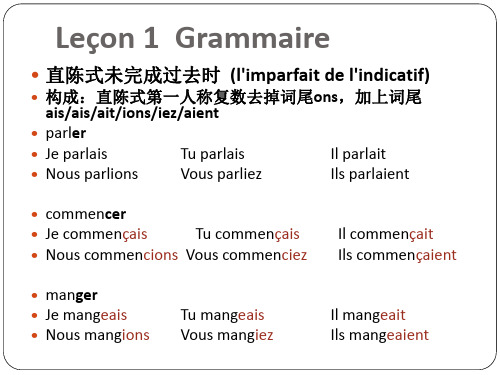
Leç on 1 Grammaire
直陈式未完成过去时 (l'imparfait de l'indicatif) 构成:直陈式第一人称复数去掉词尾ons,加上词尾 ais/ais/ait/ions/iez/aient parler Je parlais Tu parlais Il parlait Nous parlions Vous parliez Ils parlaient
Avant, sa famille habitait dans une vieille maison. A l'é poque, elle vivait mal. 但是当动作发生在限定的时间内或强调动作的完成,表示
曾经做过某事,则用复合过去时。
Leç on 1 Grammaire
Avant, on a habité pendant un mois à la campagne.
Tous les matins, il prenait le mé tro pour aller à l'é cole.
Pendant les vacances, je me couchais trè s tard.
Leç on 1 Grammaire
4. 描ntré une robe qui coû te trè s chè re.
Tu prends l'autobus 67 qui va directement au parc
Zhongshan. La jeune fille qui est prè s de la fenê tre s'appelle Marie.
背景 Ce jour-là , il faisait beau, le temps é tait magnifique, nous sommes allé sà la campagne. Il faisait nuit, la rue é tait dé serte. Dimanche dernier, je suis allé au parc Zhongshan. Il y avait beucoup de monde, on se promenait le long du lac ou se reposait sur les bancs.
未完成过去时

未完成过去时(l’imparfait)未完成过去时用来表示过去所发生的事情,表示这件事发生的起讫时间是不明确的,在所谈到的时间内一直延续进行。
1、构成:现在时第一人称复数形式去掉词尾-ons,分别+ais,ais,ait,ions,iez,aient。
Être:J’ étais, Tu étais, Il était, Nous étions, Vous étiez, Ils étaient需注意的拼法:Commencer Je commençais Nous commencionsManger Je mangeais Nous mangionsÉtudier J’ étudais Nous étudiionsvoir Je voyais Nous voyions2、用法1)表示过去延续的动作或存在的状态:A cette époque-là, la vie étais très dure dans cette région, les gens ne trouvaient pas de travail.那时候,这个地区的生活很苦,人们找不到工作。
2)表示过去习惯性或重复性的动作:L’an dernier, il quittait la maison à sept heures et demie tous les matins. 去年,他每天早晨七点半离开家。
Monsieur Durand aimait aller se promener quand il avait du temps. 杜朗先生有空儿时,喜欢去散步。
3)在主从复合句中使用,表示过去和另一动作同时发生的动作。
其中一个动作正在进行(用未完成过去时),另一动作突然发生(用复合过去时):Je regardais la télévision quand il m’a téléphoné. 我在看电视,他打来电话。
关于“l’imparfait”和“le passé composé”的用法及其比较

X 夫人昨天下午就去了摩洛哥.
*.Il est allé à l’école à sept heurs du matin.
早上7点他就去上学了.
3.在以“ etre ”作助动词的复合过去时中,过去分词的性、数要和
主语性、数相一致。如:
* Les ouvrières sont sorties de l’usine .
这里应特别注意在主从复合句中的下列用法:
(1)未完成过去时与复合过去时配合使用。两个动作或情况,一个为未
完成的或正在进行时,用未完成过去时。而另一个已一次完成,
用复合过去时。如:
* Le docteur Wang auscultait un malade quand l’infirmière est entrée dans
护士进门时,张医生正在写处方。
* Il avait six ans lorsque son père est parti pour le Maroc.
他六岁的时候,他父亲去了摩洛哥。
(3) 未完成过去时描述或解释动作发生的背景,复合过去时用于动作
的本身。如 :
* L’hiver était venu ; il faisait froid, le vent soufflait , il a mis sa veste.
promener un peu.
昨天,天气晴朗,天空蔚蓝。我走出家门散步片刻。
3. 未完成过去时常用来表示习惯性( l’habitude )或重复性
( la répétition )的过去动作。如:
* Nous nous levions à six heure au cours de nos séjours au Maroc.
【法语语法】未完成过去时L27imparfait
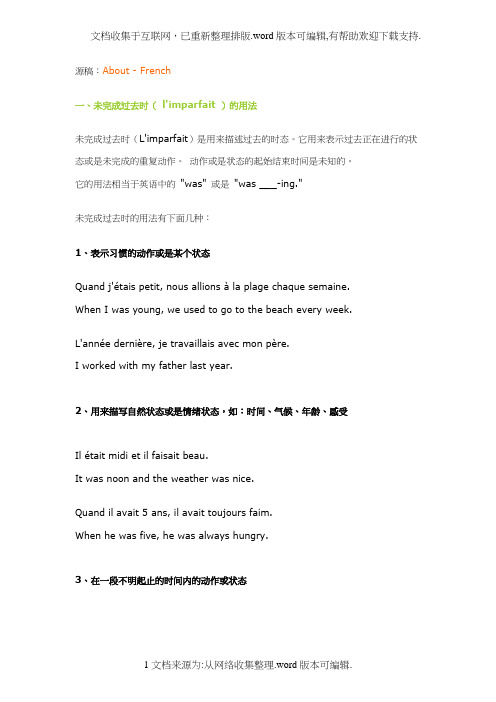
源稿:About - French一、未完成过去时(l'imparfait )的用法未完成过去时(L'imparfait)是用来描述过去的时态。
它用来表示过去正在进行的状态或是未完成的重复动作。
动作或是状态的起始结束时间是未知的。
它的用法相当于英语中的"was" 或是"was ___-ing."未完成过去时的用法有下面几种:1、表示习惯的动作或是某个状态Quand j'étais petit, nous allions à la plage chaque semaine.When I was young, we used to go to the beach every week.L'année dernière, je travaillais avec mon père.I worked with my father last year.2、用来描写自然状态或是情绪状态,如:时间、气候、年龄、感受Il était midi et il faisait beau.It was noon and the weather was nice.Quand il avait 5 ans, il avait toujours faim.When he was five, he was always hungry.3、在一段不明起止的时间内的动作或状态Je faisais la queue parce que j'avais besoin de billets.I stood in line because I needed tickets.Il espérait te voir avant ton départ.He was hoping to see you before you left.4、与过去完成时(passé composé)连用,表示其动作发生的背景J'étais au marché et j'ai acheté des pommes.I was at the market and I bought some apples.Il était à la banque quand il l'a trouvé.He was at the bank when he found it.5、表示愿望或建议Ah ! Si j'étais riche !Oh, if only I were rich!Si nous sortions ce soir ?How about going out tonight?6、用于si引导的条件句中Si j'avais de l'argent, j'irais avec toi.If I had some money, I would go with you.S'il voulait venir, il trouverait le moyen.If he wanted to come, he would find a way.7、用于短语être en train de和venir de 的过去时J'étais en train de faire la vaisselle.I was (in the process of) doing the dishes.Il venait d'arriver.He had just arrived.变位形式未完成过去时的变位去掉现在式第二人称复数(nous)的词尾-ons,加上-ais,-ais,-ait,-ions,iez,-aientje -ais nous -ionstu -ais vous -iezil/elle/on -ait ils/elles -aient唯一一个不例外的动词是Être,它用词根ét-开头,但词尾规律仍是这样的。
基础法语语法:未完成过去时

!1. 构成:a. 词尾:- ais, -ais, -ait, -ions, -iez, -aientb. 词根:第一人称复数直陈式现在时的词根c. 几个特殊变位:- être: j’étais, tu étais, il était, nous étions, vous étiez, ils étaient- 以-ger结尾:je mangeais, nous mangions- 以-cer结尾:je commençais, nous commencions- 以-ier, -yer, -gner结尾:nous remerciions, vous essuyiez, nous signiions…2. 表示一种描述和情景3. 动作或状态的延续(无明显的具体起讫)- 动作已完成和有明显的时间界限则必须用复合过去时4. 重复和过去的习惯5.另一动作发生时或完成时,正在发生的动作或持续的状态a. 发生时- 发生的动作:复合过去时- 正在发生的动作:未完成过去时b. 完成时- 完成的动作和正在发生的动作:未完成过去时6.其他情况a. 减弱语气b. Si引导的条件句c. 过去时的间接引语d. être, penser, croire, savoir 常用未完成过去时7.未完成过去时和复合过去时的辨析a. 未完成过去时——一个状态b. 复合过去时——一个动作8. 未完成过去时用于最近将来时和最近过去时a. aller (imparfait) + infinitif ——过去最近将来时b. Venir(imparfait) de + infinitif ——过去的最近过去时。
直陈式未完成时

直陈式未完成过去时:(l’imparfait de l’indicatif)1)构成:去掉直陈式现在时第一人称复数的词尾-ont,另加词尾-ais, -ais, -ait, -ions, -iez, -aient就构成直陈式未完成过去时。
例如:第一组动词第二组动词第三组动词Parler finir lireNous parlons nous finissons nous lisonsJe parlais je finissais je lisaisTu parlais tu finissais tu lisaisIl/elle parlait il/elle finissait il/elle lisaitNous parlions nous finissions nous lisionsVous parliez vous finissiez vous lisiezIls/elles parlaient ils/elles finissaient ils/elles lisaient但动词être是例外:Etre : j’étais nous étionsTu étais vous étiezIl/elle était ils/elles étaient请注意下列动词未完成过去时的拼法:Commencer : je commençais nous commencionsManger : je mangeais nous mangionsEtudier : j’étudiais nous étudiionsEnvoyer : j’envoyais nous envoyionsVoir : je voyais nous voyionsFaire : je faisais nous faisionsFalloir : il fallaitValoir : il valaitPleuvoir : il pleuvait2)基本用法:(1)延续的状态,表示过去存在过一段时间,不知何时起讫的动作。
未完成过去时
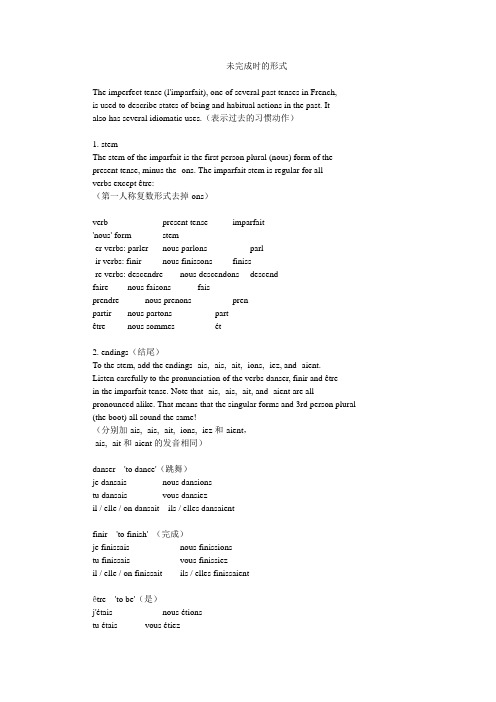
未完成时的形式The imperfect tense (l'imparfait), one of several past tenses in French,is used to describe states of being and habitual actions in the past. Italso has several idiomatic uses.(表示过去的习惯动作)1. stemThe stem of the imparfait is the first person plural (nous) form of the present tense, minus the -ons. The imparfait stem is regular for allverbs except être:(第一人称复数形式去掉-ons)verb present tense imparfait'nous' form stem-er verbs: parler nous parlons parl--ir verbs: finir nous finissons finiss--re verbs: descendre nous descendons descend-faire nous faisons fais-prendre nous prenons pren-partir nous partons part-être nous sommes ét-2. endings(结尾)To the stem, add the endings -ais, -ais, -ait, -ions, -iez, and -aient.Listen carefully to the pronunciation of the verbs danser, finir and êtrein the imparfait tense. Note that -ais, -ais, -ait, and -aient are all pronounced alike. That means that the singular forms and 3rd person plural (the boot) all sound the same!(分别加-ais, -ais, -ait, -ions, -iez和-aient,-ais, -ait和-aient的发音相同)danser 'to dance'(跳舞)je dansais nous dansionstu dansais vous dansiezil / elle / on dansait ils / elles dansaientfinir 'to finish' (完成)je finissais nous finissionstu finissais vous finissiezil / elle / on finissait ils / elles finissaientêtre 'to be'(是)j'étais nous étionstu étais vous étiezil / elle / on était ils / elles étaientStem changing verbs like voyager and commencer add an e or ? to maintainthe soft g or s sound, before imparfait endings which begin with a (jevoyageais, tu voyageais, il / elle / on voyageait, ils / elles voyageaient),in other words, before all forms except nous and vous (nous voyagions,vous voyagiez).The imparfait of pronominal verbs is regular, with the addition of thereflexive pronoun:(代词动词)s'amuser 'to have fun'je m'amusais nous nous amusionstu t'amusais vous vous amusiezil / elle / on s'amusait ils / elles s'amusaientThe negation is formed as usual by placing ne ... pas around theconjugated verb: Je ne dansais pas (I wasn't dancing / I didn't used todance), Tu ne t'amusais pas (You weren't having a good time / You didn'tused to have a good time).对话Listen to Tex describing his morning:Tex: Je suis allé chez Tammy ce matin. Je voulais la voir, mais ellen'était pas chez elle. J'avais un cadeau à lui donner. Je ne pouvaisquand même pas le laisser devant sa porte! Donc je l'ai offert à Bette!J'espère qu'elle l'aimera.Tex: I went to Tammy's this morning. I wanted to see her, but she was nothome. I had a present to give her. I could not really leave it outsideher door! So I gave it to Bette! I hope she will like it.Joe-Bob: Bravo! Quel tombeur tu fais!Joe-Bob: Bravo! What a Casanova you are!练习Give the imparfait of the verb indicated in parentheses.1. Joe-Bob ______ son ami Corey quand il a rencontré une belle minette.(chercher)2. Fiona et Bette: Nous ______ nos devoirs quand le cours a commencé .(finir)3. Edouard ______ le repas quand le client a commandé du ketchup.(servir)4. Fiona: J'______ la musique fran?aise quand Joe-Bob est arrivé .(écouter)5. Tammy et Bette ______ du shopping quand Tammy est tombée dans larivière. (faire)6. Bette ______ à l'amour de Tex quand Tammy est arrivée .(réfléchir)7. Fiona: Corey, tu ______ de l'insecticide toute la soirée? (boire)8. Tex: Joe-Bob et Corey, vous ______ des voix mystérieuses pendant lecours? (entendre)。
法语时态汇总(含构成用法及例句)
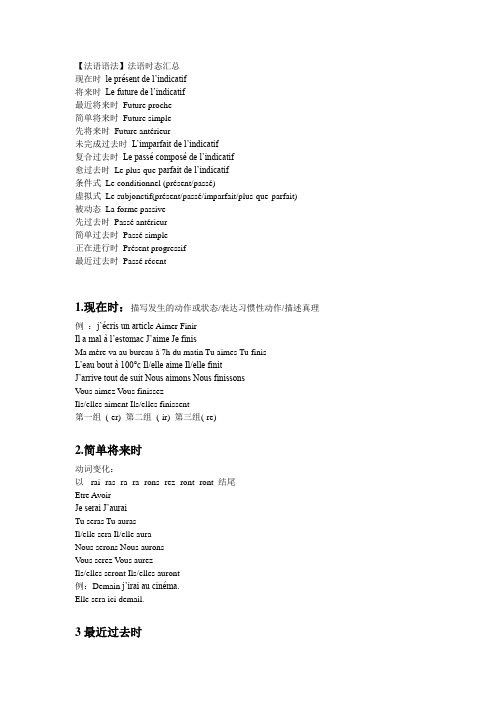
【法语语法】法语时态汇总现在时le présent de l’indicatif将来时Le future de l’indicatif最近将来时Future proche简单将来时Future simple先将来时Future antérieur未完成过去时L’imparfait de l’indicatif复合过去时Le passé composé de l’indicatif愈过去时Le plus-que-parfait de l’indicatif条件式Le conditionnel (présent/passé)虚拟式Le subjonctif(présent/passé/imparfait/plus-que-parfait)被动态La forme passive先过去时Passé antérieur简单过去时Passé simple正在进行时Présent progressif最近过去时Passé récent1.现在时:描写发生的动作或状态/表达习惯性动作/描述真理例:j’écris un articl e Aimer FinirIl a mal à l’estomac J’aime Je finisMa mère va au bureau à 7h du matin Tu aimes Tu finisL’eau bout à 100°c Il/elle aime Il/elle finitJ’arrive tout de suit Nous aimons Nous finissonsV ous aimez Vous finissezIls/elles aiment Ils/elles finissent第一组(-er) 第二组(-ir) 第三组(-re)2.简单将来时动词变化:以-rai -ras -ra -ra -rons -rez -ront -ront 结尾Etre AvoirJe serai J’auraiTu seras Tu aurasIl/elle sera Il/elle auraNous serons Nous auronsV ous serez Vous aurezIls/elles seront Ils/elles auront例:Demain j’irai au cinéma.Elle sera ici demail.3最近过去时表达刚刚结束的动作Aller+动词原形4最近将来时Venir de +动词原形Je vais aller au cinéma.我将要去电影院Je viens de partir.我刚刚走5未完成过去时动词变化:以-ais -ais -ait -ait –ions- iez –aient –aient结尾表达过去描写的背景/ 环境/人物未完成过去时主要表达/描写/叙述/事情表达过去发生的习惯性动作Hier martin ,il faisait mauvais, le ciel était nuageux.昨天早上天气很坏,乌云密布Quand j’étais à paris ,je me promenais tout les jours au bord de la Seine.当我在巴黎的时候,每天我都去河边散步比较最近将来时未完成过去时最近过去时IL est sept heurts, le match va finir. 现在七点比赛马上结束IL était sept heurts le match allais finir. 那时是7点比赛马上结束Ma fille est contente, elle viens de recevoir un cadeau.我女儿很高兴,他刚刚收到一个礼物Ma fille étais contente , elle venait de recevoir un cadeau.我女儿那时很高兴,他刚收到一个礼物6复合过去时动词变化être(avoir)+过去分词表示已经结束的动作Il est sorti 他出去了Elle a démenagé他已经搬家了Etre做助动词用于venir partir entrer montre desendre reste tombre sortir等注以se 形式的自反动词也用être做助动词剩下用avoir做助动词第一组动词将词尾-er换成-é parler parlé第二组动词将词尾-ir换成-i finir fini第三组动词有四种词尾:-i -u -s -t sortirrépondremettredire sortirépondumisdit有些第三组动词过去分词:avoir euêtre étéfaire faitlire lu attendre attenduentendre entenduconnaître connuvouloir voulupouvoir pusavoir suvoir vubire bufalloir fallupleuvoir pluprendre priscomprendre comprisecrire écritBien, déjà, beaucoup, encore等副词放在助动词与过去分词之间。
法语干货来了!总结一下l’imparfait和le passé composé 的用法
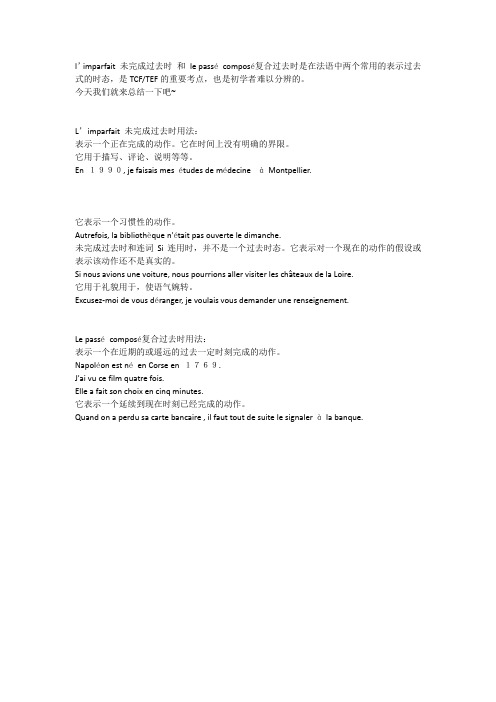
l’imparfait 未完成过去时和le passécomposé复合过去时是在法语中两个常用的表示过去式的时态,是TCF/TEF的重要考点,也是初学者难以分辨的。
今天我们就来总结一下吧~L’imparfait 未完成过去时用法:表示一个正在完成的动作。
它在时间上没有明确的界限。
它用于描写、评论、说明等等。
En 1990, je faisais mes études de médecine àMontpellier.它表示一个习惯性的动作。
Autrefois, la bibliothèque n'était pas ouverte le dimanche.未完成过去时和连词Si连用时,并不是一个过去时态。
它表示对一个现在的动作的假设或表示该动作还不是真实的。
Si nous avions une voiture, nous pourrions aller visiter les châteaux de la Loire.它用于礼貌用于,使语气婉转。
Excusez-moi de vous déranger, je voulais vous demander une renseignement.Le passécomposé复合过去时用法:表示一个在近期的或遥远的过去一定时刻完成的动作。
Napoléon est néen Corse en 1769.J'ai vu ce film quatre fois.Elle a fait son choix en cinq minutes.它表示一个延续到现在时刻已经完成的动作。
Quand on a perdu sa carte bancaire , il faut tout de suite le signaler àla banque.。
法语语法:复合过去时和未完成过去时Passé-composé-et-imparfaitPPT课件

7. Dire-dit, écrire-écrit, interdire-interdit, faire-fait
8. Ouvrir-ouvert, offrir-offert, couvrir-couvert, découvrir-découvert
9. Produire-produit, traduire-traduit, conduire-conduit, construireconstruit
.
3
3. 用法和位置: Ex: J’ai mangé du poisson à midi. As-tu pris le petit-déjeuner ? Elle n’a pas fait de sport.
2)bien, aussi, toujours, trop, beaucoup, rien, pas, jamais 等副 词放在助动词和过去分词之间(但是personne 放在最后) Vous avez beaucoup travaillé. Je n’ai rien vu. Je n’ai pas mangé. Elle n’a vu personne.
.
6
注:有些动词既可以用avoir,也可以用être做助动词,vi时用 être,vt时用avoir
Passer vi .经过 Il est passé par ici. Vt.度过 Il a passé ses vacances à Paris.
Rentrer vi 回来 Je suis rentré. Vt 回收,收进 Elle a rentré les vêtements.
Monter Vi 登上,爬上 Elle est montée dans sa chambre. Vt 往上搬;搭建 Il a monté une tente
imparfait变位规则
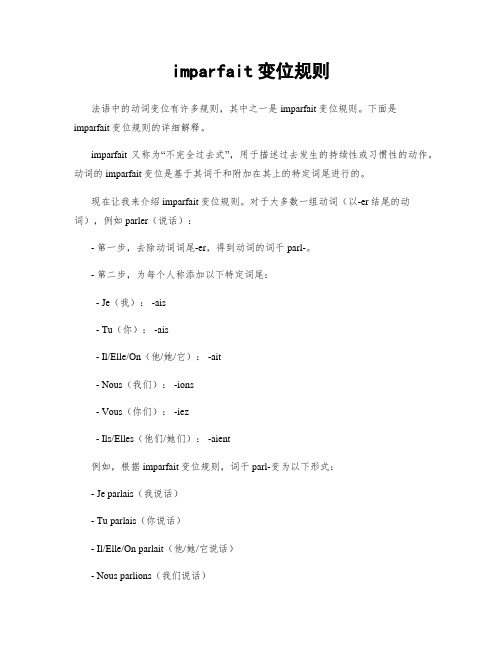
imparfait变位规则
法语中的动词变位有许多规则,其中之一是imparfait变位规则。
下面是imparfait变位规则的详细解释。
imparfait又称为“不完全过去式”,用于描述过去发生的持续性或习惯性的动作。
动词的imparfait变位是基于其词干和附加在其上的特定词尾进行的。
现在让我来介绍imparfait变位规则。
对于大多数一组动词(以-er结尾的动词),例如parler(说话):
- 第一步,去除动词词尾-er,得到动词的词干parl-。
- 第二步,为每个人称添加以下特定词尾:
- Je(我): -ais
- Tu(你): -ais
- Il/Elle/On(他/她/它): -ait
- Nous(我们): -ions
- Vous(你们): -iez
- Ils/Elles(他们/她们): -aient
例如,根据imparfait变位规则,词干parl-变为以下形式:
- Je parlais(我说话)
- Tu parlais(你说话)
- Il/Elle/On parlait(他/她/它说话)
- Nous parlions(我们说话)
- Vous parliez(你们说话)
- Ils/Elles parlaient(他们/她们说话)
而对于其他组的动词,例如finir(结束)或voir(看见),其变位也是有规律的,但规则略有不同。
在这里,我们只介绍一组动词的imparfait变位规则。
希望以上内容能够帮助你更好地理解imparfait变位规则。
如有任何进一步的问题,请随时向我询问。
法语时态总结L'imparfait

IntroductionL’imparfait exprime et décrit des faits et actions dans le passé en soulignantle déroulement ou la répétition de ceux-ci. C’est le temps du récit, en premier lieu dans la langue écrite.les gâteaux.Tous les jours, il faisait un gâteau avec son amie Florence.Pendant qu’il regardait la recette, Florence préparait la pâte.part au dessert.Emploi•d escription d’une situation, dans le passéExemple : Quand il était petit,Lucas aimait beaucoup les gâteaux.•d escription de personnes, commentaire, explication dans le passéExemple : Lucas était un enfant très gourmand. •a ction habituelle ou qui se répète dans le passéExemple : Tous les jours, il faisait un gâteau avecson amie Florence.•a ctions qui se déroulent simultanément dans le passéExemple : Pendant qu’il regardait la recette,Florence préparait la pâte.•i nsistance sur le fait qu’une action dure longtemps dans le passéExemple :Ils cuisaient le gâteaupuis mangeaient une part au dessert. FormationPour former l’imparfait, on ajoute les terminaisons suivantes au radical (présent) de la 1re personne du pluriel (ces terminaisons sont les mêmes pour tous les groupes) :en -ir appartiennent au 2e groupe et se conjuguent comme finir. La particularité de cette conjugaison est l’allongement du radical au pluriel (-iss). Parmi ces verbes, on peut citer choisir, réagir, réfléchir et réussir.** La plupart des verbes en -ir qui appartiennent au 3e groupe (et ne seconjuguent donc pas comme finir) se conjuguent comme dormir. Parmi ces verbes, on trouve mentir, partir, sentir et sortir.Le verbe avoir est régulier. Seul être estirrégulier à l’imparfait.Remarques•L es verbes en -cer prennent au présentun ç à la 1re personne du pluriel. Cetteforme est utilisée pour construire l’imparfait, le ç remplace le c à toutes les personnes (afin de préserver le son du c doux), mises àpart les 1re et 2e personnes du pluriel.Exemple : lancer – nous lançonsje lançais, tu lançais, il lançait, nouslancions, vous lanciez, ils lançaient•L es verbes en -ger prennent au présentun e à la 1re personne du pluriel. Cette forme est utilisée pour construire l’imp arfait, le e se retrouve à toutes les personnes (afin de préserver le son du g doux), mises à part les 1re et 2e personnes du pluriel.Exemple : manger – nous mang eonsje mangeais, tu mangeais, il mangeait,nous mangions, vous mangiez, ilsmangeaient•L es verbesimpersonnels falloir et pleuvoir qui ne sontemployés qu’à la 3e personne du singulier ont à l’imparfait les formes suivantes :Exemples : falloir → il fallaitpleuvoir → il pleuvait。
法语复合过去式 和 未完成过去式
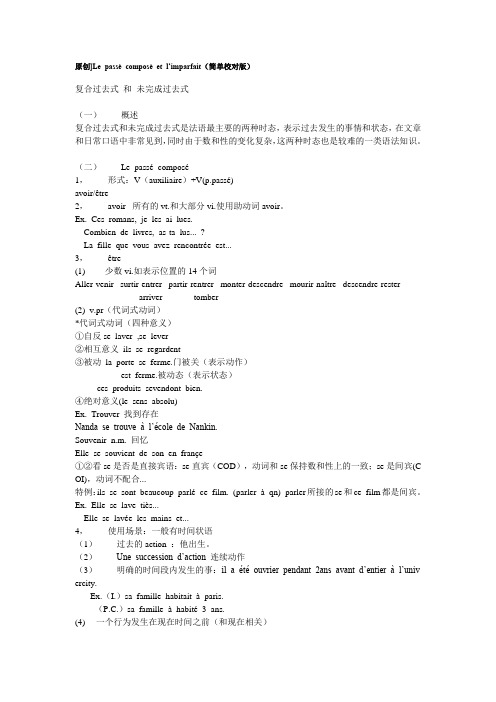
原创]Le passé composé et l’imparfait(简单校对版)复合过去式和未完成过去式(一)概述复合过去式和未完成过去式是法语最主要的两种时态,表示过去发生的事情和状态,在文章和日常口语中非常见到,同时由于数和性的变化复杂,这两种时态也是较难的一类语法知识。
(二) Le passécomposé1,形式:V(auxiliaire)+V(p.passé)avoir/être2, avoir 所有的vt.和大部分vi.使用助动词avoir。
Ex. Ces romans, je les ai lues.Combien de livres, as-ta lus... ?La fille que vous avez rencontrée est...3, être(1) 少数vi.如表示位置的14个词Aller-venir surtir-entrer partir-rentrer monter-descendre mourir-naître descendre-rester -arriver -tomber(2) v.pr(代词式动词)*代词式动词(四种意义)①自反se laver ,se lever②相互意义ils se regardent③被动la porte se ferme.门被关(表示动作)est ferme.被动态(表示状态)ces produits sevendont bien.④绝对意义(le sens absolu)Ex. Trouver 找到存在Nanda se trouve à l’école de Nankin.Souvenir n.m. 回忆Elle se souvient de son en françe①②看se是否是直接宾语:se直宾(COD),动词和se保持数和性上的一致;se是间宾(C OI),动词不配合...特例:ils se sont beaucoup parléce film. (parler àqn) parler所接的se和ce film都是间宾。
简明法语教程第24课

用法3(典型用法)
用于描写故事的背景,天气,人物,环境,气 氛等。 如:昨天,天气不好,有风。Il fait,il y a Hier,il faisait mauvais et il y avait du vent. 玛丽二十来岁,穿着蓝裙子,他对我们非常热情。 avoir porter être gentil avec une vingtaine de Marie avait une vingtaine d’années,portait une robe bleue,elle était gentille avec nous!
与复合过去时态的区别
未完成过去时 表示的是过去持续过 一段时间的动作,或 是过去经常性的,有 规律的动作,常用于 描述当中。——线(延 续性)
复合过去时 表示发生过的动作, 或是已经结束的动 作。——点(瞬间发 生)
未完成过去时所表示的动作在过去的时间上有延续性、 重复性或描述性。 复合过去时表示的延续性很短暂,强调动作而不是状 态,而且必须是完成的,通常带有表示时间限制的状 语。 如:当他进来entrer时,我正在写字écrire。 quand il est entré, j’écrivais. 他跟我说dire他生病être了。 il m'a dit qu'il était malade. 昨天,当我出门sortir的时候,下雨pleuvoir了。 hier,quand je suis sorti,il pleuvait. 昨天,我在街上走marcher了两个小时。 hier,j’ai marché dans la rue pendant deux heu的动作,一般 会有习惯性的副词修饰。 如:过去我经常六点起床se lever。Souvent Toutefois,je me levais souvent à six heures. 以前我总是在这度假prendre des vacances。Toujours Avant,je prenais toujours mes vancances ici. 过去我们每天都做运动faire du sport。Chaque jour Autrefois,nous faisions du sport chaque jour.
法语直陈式完成过去时及未完成过去时
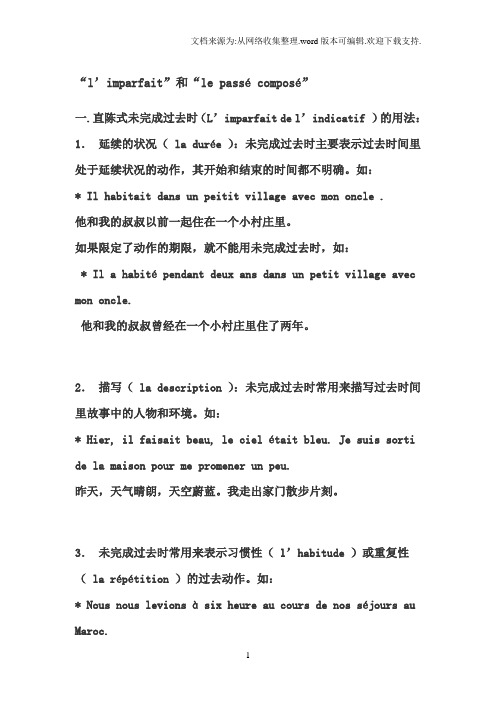
“l’imparfait”和“le passé composé”一.直陈式未完成过去时(L’imparfait de l’indicatif )的用法:1.延续的状况(la durée ):未完成过去时主要表示过去时间里处于延续状况的动作,其开始和结束的时间都不明确。
如:* Il habitait dans un peitit village avec mon oncle .他和我的叔叔以前一起住在一个小村庄里。
如果限定了动作的期限,就不能用未完成过去时,如:* Il a habité pen dant deux ans dans un petit village avec mon oncle.他和我的叔叔曾经在一个小村庄里住了两年。
2.描写( la description ):未完成过去时常用来描写过去时间里故事中的人物和环境。
如:* Hier, il faisait beau, le ciel était bleu. Je suis sorti de la maison pour me promener un peu.昨天,天气晴朗,天空蔚蓝。
我走出家门散步片刻。
3.未完成过去时常用来表示习惯性(l’habitude )或重复性(la répétition )的过去动作。
如:* Nous nous levions à six heure au cours de nos séjours au Maroc.在摩洛哥逗留期间,我们每天六点钟起床。
* Quand j’étais à l’école secondaire, j’allais tous les ans chez mongrand-père .pendant les vacances d’été.在我念中学时,我每年暑期去祖父家。
法语语法:复合过去时和未完成过去时Passé-composé-et-imparfait

3. 用法和位置: Ex: J’ai mangé du poisson à midi. As-tu pris le petit-déjeuner ? Elle n’a pas fait de sport.
2)bien, aussi, toujours, trop, beaucoup, rien, pas, jamais 等副 词放在助动词和过去分词之间(但是personne 放在最后) Vous avez beaucoup travaillé. Je n’ai rien vu. Je n’ai pas mangé. Elle n’a vu personne.
• 注意:配合的情况。
Attention : 如果代词式动词的代词是直接宾语,pp 要配合,如果代 词是间接宾语,则 pp 不用配合。
Ex : Elle s'est lavée. Elle s’est lavé les mains.
Elle s'est lavée dans la salle de bains. Elle s'est lavé les mains.
Passé composé et imparfait
Le passé composé
• 助动词 ( avoir, être)+过去分词
I.所有及物动词以及大部分不及物动词均由avoir做助动词
1. 构成:
• 第一组规则动词+aller:去掉词尾的er, 变成é Ex: chanter-chanté, danser-dansé, aller-allé
• II.少数不及物动词以être做助动词
1. 构成:naître ( né,e), mourir (mort,e), aller( allé,e), partir ( parti,e), sortir (sorti,e), arriver( arrivé,e), retourner(retourné,e), venir ( venu,e), revenir (revenu,e), rentrer( rentré,e), entrer(entré,e), rester(resté,e), devenir( devenu,e), tomber(tombé,e), monter(monté,e), descendre (descendu,e)
直陈式未完成过去时

直陈式未完成过去时L’imparfait de l’indicatif未完成过去时是法语最常用的过去时态之一,但对于中国学生来说,也是最难掌握的时态之一。
对于该时态的讲解方式甚至术语,各语法学家不尽一致。
在某些句子里,从语法意义上的正确时态不止一种,不同的时态反映出作者不同的意图。
学习完本课,学生未必能熟练、全面地掌握该时态的用法。
需要在今后的学习中,认真体会每一个动词的变位,反复思考作者使用某种时态的理由,假以时日,才能基本掌握未完成过去时的使用方法。
本人试图照顾到中国学生的特点,以最容易理解的方式来讲授未完成过去时。
一、未完成过去时的构成。
1.除了为数不多的例外,将直陈式现在时第一人称复数词尾的-ons去掉,根据主语的不同分别加上以下词尾:-ais, -ais, -ait, -ions, iez, -aient。
2.être的变位特殊:j’étais, tu étais, il était, nous étions, vous étiez, ils étaient.3.以-ger和-cer结尾的动词,由于发音的原因,变位有小变化。
例如:je mangeais, jecommençais。
4.注意以-ier和-yer结尾动词的第一、第二人称复数的变位:nous etudiions, vous etudiiez;nous payions, vous payiez, etc.二、未完成过去时的用法。
未完成过去时表示在过去的某一时间未完成的动作或状态,其起止时间不详,经常与复合过去时或简单过去时配合使用。
许多人用四种特性来描述其用法。
1.延续性(la durée)。
表示过去的起止时间不详的延续的动作或状态。
例如:Autrefois, laplupart des Chinois vivaient àla campagne. A cette époque-là, j’avais les cheveux longs.Les hommes préhistoriques étaient des guerriers.2.重复性或习惯性(la répétition)。
- 1、下载文档前请自行甄别文档内容的完整性,平台不提供额外的编辑、内容补充、找答案等附加服务。
- 2、"仅部分预览"的文档,不可在线预览部分如存在完整性等问题,可反馈申请退款(可完整预览的文档不适用该条件!)。
- 3、如文档侵犯您的权益,请联系客服反馈,我们会尽快为您处理(人工客服工作时间:9:00-18:30)。
源稿:About - French
&id=380711
一、未完成过去时( l'imparfait )的用法
未完成过去时(L'imparfait)是用来描述过去的时态。
它用来表示过去正在进行的状态或是未完成的重复动作。
动作或是状态的起始结束时间是未知的。
它的用法相当于英语中的 "was" 或是 "was ___-ing."
未完成过去时的用法有下面几种:
1、表示习惯的动作或是某个状态
Quand j'étais petit, nous allions à la plage chaque semai ne.
When I was young, we used to go to the beach every week.
L'année dernière, je travaillais avec mon père.
I worked with my father last year.
2、用来描写自然状态或是情绪状态,如:时间、气候、年龄、感受
Il était midi et il faisait beau.
It was noon and the weather was nice.
Quand il avait 5 ans, il avait toujours faim.
When he was five, he was always hungry.
3、在一段不明起止的时间内的动作或状态
Je faisais la queue parce que j'avais besoin de billets.
I stood in line because I needed tickets.
Il espérait te voir avant ton dépar t.
He was hoping to see you before you left.
4、与过去完成时(passé composé)连用,表示其动作发生的背景
J'étais au marché et j'ai acheté des pommes.
I was at the market and I bought some apples.
Il était à la banque quand il l'a trouvé.
He was at the bank when he found it.
5、表示愿望或建议
Ah ! Si j'étais riche !
Oh, if only I were rich!
Si nous sortions ce soir
How about going out tonight
6、用于si引导的条件句中
Si j'avais de l'argent, j'irais avec toi.
If I had some money, I would go with you.
S'il voulait venir, il trouverait le moyen.
If he wanted to come, he would find a way.
7、用于短语être en train de和venir de 的过去时J'étais en train de faire la vaisselle.
I was (in the process of) doing the dishes.
Il venait d'arriver.
He had just arrived.
变位形
式
未完成过去时的变位
去掉现在式第二人称复数(nous)的词尾 -ons,加上-ais,-ais,-ait,-ions,iez,-aient
je-ais nous-ions
tu-ais vous-iez
il/elle/on-ait ils/elles-aient
唯一一个不例外的动词是Être,它用词根ét-开头,但词尾规律仍是这样的。
例:
parler finir rendre allerêtre
je parlais finissais rendais allaisétais
tu parlais finissais rendais allaisétais il parlait finissait rendait allaitétait
nous parlions
finission
s
rendions allionsétions
vous
parliez finissiez rendiez alliezétiez
ils
parlaien
t finissaie
nt
rendaien
t
allaien
t
étaien
t
注意:
1、以-cer 和 -ger 结尾的动词变位后写法上有点特例
MANGER LANCER
je mang e ais nous mangions je lançais nous lancions
tu mang e ais vous mangiez tu lançais vous lanciez
il mang e ait ils mang e aient il lançait ils lançaient
这样做是为了发音上的便利。
g 和 c 后跟一个 a 的音要发浊音,若是在 g 后添加了一个 e ,或是变c为ç可以软化发音,使之成为清音。
2、以i结尾的未完成过去时动词词根,在第一人称复数(nous)和第二人称复数(vous)变位时须要双写i 。
如:
étudier
nous étudions
未完成过去时词根:étudi-
变位==>
j'étudiais nousétud ii ons tuétudiais vousétud ii ez ilétudiait ilsétudiaient Test
1. il veut
2. nous allons
3. j'annonce
4. elles savent
5. tu as
6. vous riez
7. nous prenons
8. elle choisit
9. je dois
10. tu écris
11. nous sommes
12. vous parlez
13. ils boivent
14. on étudie
15. il cherche
16. tu vois
17. vous êtes
18. je peux
19. elles corrigent
20. nous dormons
Answers 1. il voulait
2. nous allions
3. j'annonçais
4. elles savaient
5. tu avais
6. vous riiez
7. nous prenions
8. elle choisissait
9. je devais
10. tu écrivais
11. nous étions
12. vous parliez
13. ils buvaient
14. on étudiait
15. il cherchait
16. tu voyais
17. vous étiez
18. je pouvais
19. elles corrigeaient
20. nous dormions。
